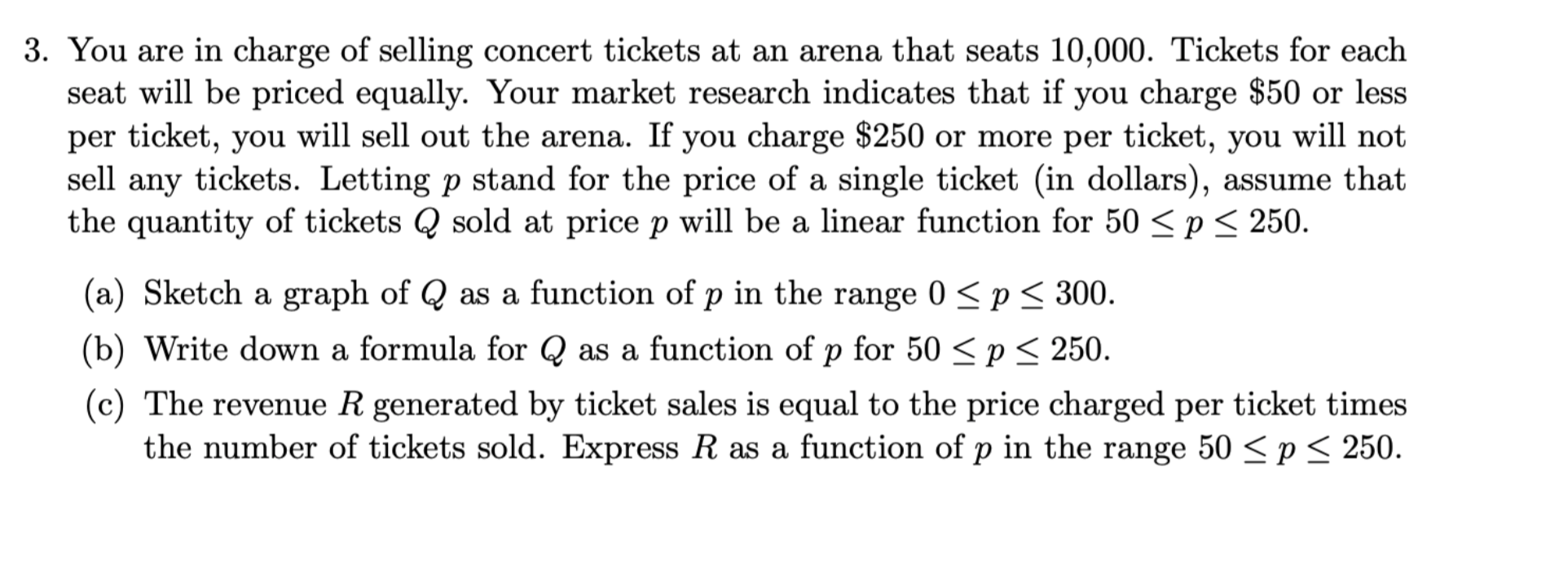3. You are in charge of selling concert tickets at an arena that seats 10,000. Tickets for each seat will be priced equally. Your market research indicates that if you charge $50 or less per ticket, you will sell out the arena. If you charge $250 or more per ticket, you will not sell any tickets. Letting p stand for the price of a single ticket (in dollars), assume that the quantity of tickets Q sold at price p will be a linear function for 50 250. (e) Find the price per ticket which will maximize the revenue generated.
3. You are in charge of selling concert tickets at an arena that seats 10,000. Tickets for each seat will be priced equally. Your market research indicates that if you charge $50 or less per ticket, you will sell out the arena. If you charge $250 or more per ticket, you will not sell any tickets. Letting p stand for the price of a single ticket (in dollars), assume that the quantity of tickets Q sold at price p will be a linear function for 50 250. (e) Find the price per ticket which will maximize the revenue generated.
Linear Algebra: A Modern Introduction
4th Edition
ISBN:9781285463247
Author:David Poole
Publisher:David Poole
Chapter2: Systems Of Linear Equations
Section2.4: Applications
Problem 16EQ
Related questions
Question

Transcribed Image Text:3. You are in charge of selling concert tickets at an arena that seats 10,000. Tickets for each
seat will be priced equally. Your market research indicates that if you charge $50 or less
per ticket, you will sell out the arena. If you charge $250 or more per ticket, you will not
sell any tickets. Letting p stand for the price of a single ticket (in dollars), assume that
the quantity of tickets Q sold at price p will be a linear function for 50 <p< 250.
(a) Sketch a graph of Q as a function of p in the range 0 <p< 300.
(b) Write down a formula for Q as a function of p for 50 <p< 250.
(c) The reveue R generated by ticket sales is equal to the price charged per ticket times
the number of tickets sold. Express R as a function of p in the range 50 < p < 250.

Transcribed Image Text:(d) Explain why the maximum revenue possible cannot be obtained with p < 50 or
p > 250.
(e) Find the price per ticket which will maximize the revenue generated.
Expert Solution
This question has been solved!
Explore an expertly crafted, step-by-step solution for a thorough understanding of key concepts.
This is a popular solution!
Trending now
This is a popular solution!
Step by step
Solved in 3 steps with 5 images

Recommended textbooks for you

Linear Algebra: A Modern Introduction
Algebra
ISBN:
9781285463247
Author:
David Poole
Publisher:
Cengage Learning

Algebra & Trigonometry with Analytic Geometry
Algebra
ISBN:
9781133382119
Author:
Swokowski
Publisher:
Cengage


Linear Algebra: A Modern Introduction
Algebra
ISBN:
9781285463247
Author:
David Poole
Publisher:
Cengage Learning

Algebra & Trigonometry with Analytic Geometry
Algebra
ISBN:
9781133382119
Author:
Swokowski
Publisher:
Cengage
